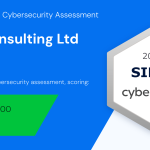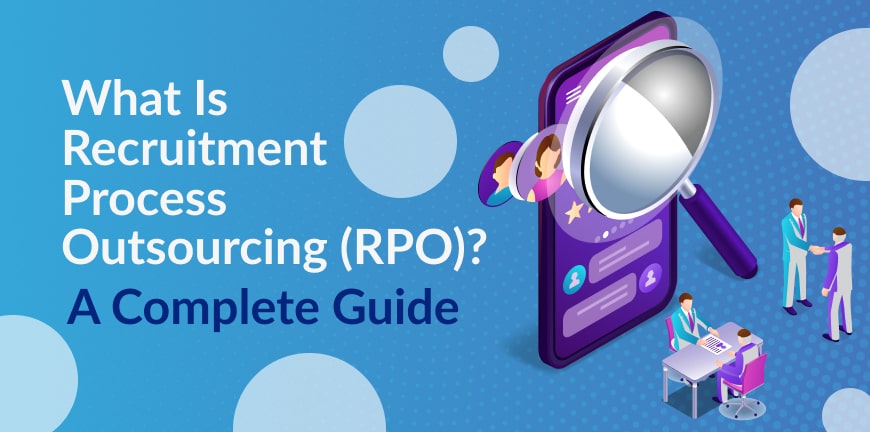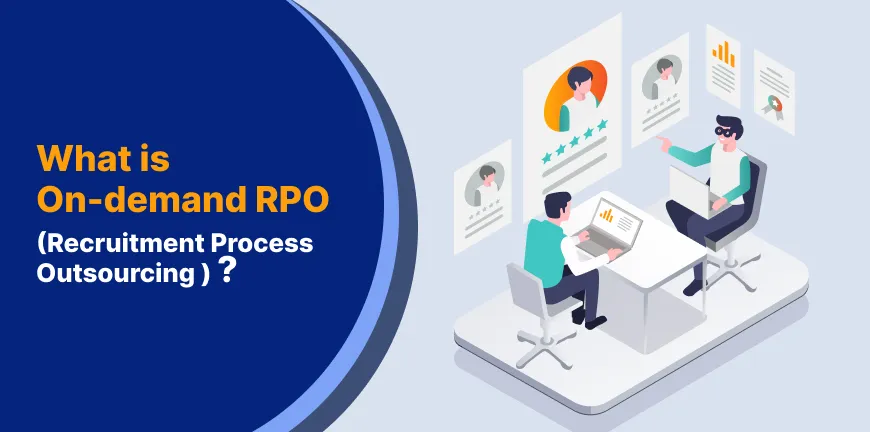
Alp Consulting Receives Silver CyberVadis Award for Cybersecurity Excellence
10/04/2025
8 Steps to Improve Your Talent Acquisition Process
13/04/2025- What is RPO? Meaning and definition
- How Does Recruitment Process Outsourcing Work?
- What are the Key Objectives of Recruitment Process Outsourcing?
- What are the Benefits of Outsourcing Recruitment and Selection Process?
- What are the Best Practices for Effective Recruitment Process Outsourcing?
- What are the Examples of Recruitment Process Outsourcing
- What are the Types of RPO Engagements?
- What are the RPO pricing models?
- What are Steps to Implement Recruitment Process Outsourcing?
- What are the Challenges of Recruitment Process Outsourcing?
- What are the Pros and Cons of Recruitment Process Outsourcing?
- Frequently Asked Questions
We know that necessity is the mother of innovation, and it applies to recruitment as well. In recent years, most companies from startups to Fortune 500 companies, have been reluctant to have in-house recruitment, and instead prefer to outsource the recruitment responsibilities to a third-party service provider with a dedicated recruitment team capable of handling all types of hiring requirements from initial screening to onboarding of selected candidates.
The recruitment process outsourcing business model or RPO is a specialised field where the core activity of the business is to manage and streamline the hiring process from scratch. Let’s dive deep and understand more about the recruitment process outsourcing meaning, objectives, benefits, challenges and all other related aspects.
What is RPO? Meaning and definition
Recruitment process outsourcing meaning is quite straightforward and states that ” It is a business service model where a company either a startup or a Fortune 500 shares partial or full responsibility of recruiting talents to a third-party service provider.
The benefits of outsourcing recruitment and selection process include quick hiring, access to top talents, reduced costs, better scalability, achieving 100% compliance, reduced HR efforts, better branding, and many more.
The type of recruitment process outsourcing business model chosen by employers will depend on the requirements and resources, but usually, 4 types are in high demand:
- Fully outsourced RPO
- Half outsourced – half in-house RPO
- Project-based RPO
- On-demand RPO
In recent years, Recruitment Process Outsourcing (RPO) has evolved significantly from a support service to the main pillar of talent acquisition. Today, top RPO service providers in India such as ALP Consulting are offering end-to-end recruitment solutions from talent acquisition consultation to employer branding and DEI (Diversity, Equity and Inclusion).
How Does Recruitment Process Outsourcing Work?
Recruitment Process Outsourcing (RPO) can work either as an independent end-to-end third-party recruitment service provider or as a supporting system for a company’s HR team for talent acquisition. The goal and objectives of an RPO are not just to fill vacancies but to leverage their experience and expertise to hire the best talents who can contribute to a company’s growth in a big way.
Whether a quick hire or building a future talent pipeline, an RPO must be ready to work diligently to match the employer’s requirements and achieve the best results. The KPIs (Key Performance Indicators) of a top RPO agency include:
- Time to fill
- Quality of hire
- Cost per hire
- Interview to offer ratio
- Offer to acceptance ratio
What are the Key Objectives of Recruitment Process Outsourcing?
The main objectives of recruitment process outsourcing are:
1. Identifying and attracting top talents
By leveraging their networking and expertise, reputed RPO agencies such as ALP Consulting identify and attract top talents to work for their clients.
2. Streamlining the hiring process
A significant activity of the recruitment process outsourcing work portfolio is streamlining the hiring process of their clients. Through technology assistance and best practices, RPO agencies will improve the candidate’s interview experience, thereby increasing the job offer acceptance rates.
3. Developing a strong talent pipeline
RPO agencies put strong efforts into creating a talent pipeline consisting of highly skilled professionals from which their clients can recruit at any time. By adopting this strategy, there will not be any last-minute hassles to find a candidate to fill an urgent position.
4. Create cost-effective and scalable recruitment solutions
RPO agencies will utilise their expertise and experience to create cost-effective recruitment solutions for their clients without compromising the quality of the hire. Also, recruitment process outsourcing model is scalable by nature and the clients can leverage this to increase or decrease the rate of hiring based on their requirements.
5. Manage risks and ensure compliance
RPO agencies ensure the entire recruitment process from initial screening to onboarding is compliant with the relevant laws and regulations. Additionally, RPO agencies also manage risks associated with recruitment ensuring both clients and candidates have a seamless hiring experience.
What are the Benefits of Outsourcing Recruitment and Selection Process?
The key recruitment process outsourcing benefits include:
1. Enhanced expertise and efficiency
A key benefit of the recruitment process outsourcing model is that companies get access to a dedicated recruitment team with extensive experience and expertise. Companies that hire RPO agencies like ALP Consulting have 40% higher chances of building an effective talent pipeline to fill their open positions.
2. Cost Effective and Scalable
By leveraging different types of recruitment process outsourcing models, companies can reduce costs per hire and overall recruitment expenses. RPOs are also scalable allowing companies to alter their recruitment efforts based on the requirements.
3. Access to a wider talent pool and Improved quality of hire
A recruitment process outsourcing meaning doesn’t restrict hiring only when needed but a creation of a wide talent pool that can be utilised at any time in the future. Additionally, RPO agencies have a diverse talent pool consisting of qualified candidates that fit niche and hard-to-fill positions.
4. Improved branding
RPO agencies ensure candidates receive the best experience from initial screening to onboarding and beyond. This will not only increase the offer acceptance rates but attract quality talents leading to the increased brand reputation of the companies in the business world and the job market.
5. Mitigation of risks and achieving compliance
RPO service providers stay up to date with the latest labour laws and regulations enabling their clients to maintain compliance throughout the recruitment process. Also, RPO companies follow proven strategies of recruitment from initial screening to onboarding and background verification thereby mitigating risks such as bad hires, legal issues, and other issues.
What are the Best Practices for Effective Recruitment Process Outsourcing?
The best practices for implementing effective recruitment process outsourcing include:
1. Set Clear Expectations and Communication
Effective recruitment process outsourcing work begins with setting clear expectations and communication between the RPO agency and the company. Defining hiring needs, setting clear goals, understanding of company’s work culture, and specific requirements of each vacancy, and creating open channels of communication and feedback are essential to achieving the best outcomes.
2. Collaborative Partnership
An RPO agency must be thought of as an extension of the HR team rather than just a third-party service provider. A collaborative partnership can go a long way in achieving the best outcomes in terms of hiring quality candidates and improving brand reputation. Regular strategy meetings, feedback sessions, performance reviews, and mutual learning will streamline the hiring process and build a wider talent pool.
3. Utilisation of Technology
RPO agencies leverage technology like never before making the recruitment process seamless and fast. Some of the advanced tools used in the recruitment process include ATS (applicant tracking systems) Integration, video interviewing platforms, AI-powered sourcing tools, and data analytics. Both RPO agencies and their client firms must utilise technology to streamline the hiring process and achieve the best outcomes.
4. Focus on candidate experience
A seamless interview experience for candidates is vital to increase the acceptance rates and get quality hires. Both RPOs and companies must focus on providing the best interview experience for candidates through personalised communication, quick responses to queries, simplified application and onboarding process, and reduced delays in finalising the job offer.
5. Measure and optimise
Continuous measurement and optimisation of the hiring process from initial candidate profile screening to onboarding is key to the success of an RPO collaboration. Defining KPIs (Key Performance Indicators) such as quality of hires, time-to-fill, and cost per hire is key and measuring its performance against industry standards will help in identifying gaps and making improvements in the overall hiring process.
What are the Examples of Recruitment Process Outsourcing
Here is an example of recruitment process outsourcing that will shed light on when to go for an RPO agency to get quality hires.
An IT services start-up has acquired a large app development project that has to be developed and launched in a very short time. The client is ready to bear all the costs of hiring, equipment, and all the other necessary sources.
As it is a startup, the HR team may not be able to handle the responsibility of recruiting hundreds of IT talents to execute the project. This is where an RPO agency like ALP Consulting comes into the picture and can solve this bottleneck effectively.
If the requirements and hiring timelines are clearly discussed and shared, ALP can leverage its vast network and wide talent pool to hire quality candidates to fill the job positions in a short duration. The advantage here is that the ALP will complete the requirements, and you can start with the project execution on an immediate basis once the onboarding of candidates is completed.
Post this, you don’t have to use the RPO services till you get a new requirement from the client. It is a win-win situation for both the startup and the RPO agency ALP Consulting.
What are the Types of RPO Engagements?
Although there are various types of recruitment process outsourcing models, among them 3 are the most in-demand among companies that look for RPO agency for their recruitment needs.
1. On-demand RPO
The job market is volatile and continuously evolving. In some quarters, hiring needs may be skyrocketing, and in others, it might be nosediving depending on the market conditions. In such cases, On-demand RPO might be the best recruitment process outsourcing business model that companies can opt for.
Here companies and RPOs will enter a contract-based engagement where whenever hiring needs are increasing, the RPO team is asked to be engaged and get quality hires in a short time. Contrastingly, if there are no hiring needs in a quarter, the company can just disengage with an RPO agency without bearing any additional costs.
2. Function-based RPO
In a function-based RPO, an agency will only take full hiring responsibilities for a specific division and the in-house HR team will take care of the recruitment for all remaining departments. Ex: A digital marketing agency might hire a Function-based RPO for recruiting software developers and the company’s in-house recruitment will take care of hiring for other departments such as SEO, content, marketing, and business administration.
3. Full Recruitment Process Outsourcing (RPO)
In this type of recruitment process outsourcing model, a company will engage an RPO agency full-time and ask them to function as an in-house recruitment team. It is a win-win situation for both parties as RPOs can form long-term partnerships with clients and the clients can get full access to a wide talent pool creating zero delays in hiring.
What are the RPO pricing models?
The RPO pricing model choice varies based on the factors such as:
- Type of recruitment process outsourcing model required
- Duration and the urgency of the RPO engagement,
- Positions, locations, and the skillsets hired for
- Requirement of added services
Based on the above factors, there are some standard RPO pricing models to choose from:
- Monthly management fee only: Here the RPO agency charges a monthly management fee for engaging its recruitment team and cover operational expenses.
- Minimal monthly management fee plus success fee: Here the monthly management fee is comparatively less than the monthly management fee-only model. Additionally, a success fee must be paid after each confirmed hire which might be calculated as a percentage of the candidate’s annual base salary.
- Reduced monthly management fee plus flat rate fee: Here the RPO agency will charge a reduced monthly management fee plus a flat rate fee for each successful placement suitable for companies with large hiring requirements.
- Success fee only: Here the RPO agency will charge for each successful placement.
What are Steps to Implement Recruitment Process Outsourcing?
Each client and RPO agency have their own ways of hiring talented professionals and it varies based on requirements and the urgency of the filling positions. Anyways, here are the typical steps of recruitment process outsourcing that most agencies and clients follow for the best outcomes:
1. Assess the hiring needs
The outsourcing recruitment and selection process will be defined by the client’s requirements. An initial discussion will be conducted between the RPO agency and the client to gather all the requirements such as experience, skills, position, expected CTC, notice period, etc.
2. Prepare a detailed job description
Once the hiring requirements are clear, a detailed recruitment process outsourcing job description must be prepared. The JD will include the roles and responsibilities of the position, the experience and skills needed, the compensation offered, and all other important requirements. A well-prepared JD will help in receiving applications from the right candidates.
3. Talent Search
Recruitment process outsourcing work starts from here where the RPO agency will use all its resources and networking capabilities to create possible pool of candidates fit for the role.
4. Initial screening and shortlisting
Once all the applications are received, the outsourcing recruitment and selection process will begin where initial screening of resumes will be done and then suitable candidates that match the requirements are shortlisted.
5. Interviewing
The shortlisted candidates will undergo a series of interview rounds like aptitude tests, technical rounds, group discussions, HR rounds, face-to-face rounds, managerial rounds, etc.
6. Job offer
The best candidates who have cleared all the interview rounds will be given a job offer that includes an offer of employment, salary breakup, rules and regulations of the company, and a notice period. The job offer will be valid only if the selected candidate accepts the offer and provides a written acknowledgement of acceptance.
7. Onboarding and Induction
This is the last step where the RPO agency will conduct pre-onboarding formalities like checking documents, background verification, and other formalities. Once the formalities are done the candidate will become an official employee of the company and the induction process will be initiated.
What are the Challenges of Recruitment Process Outsourcing?
The common challenges of recruitment process outsourcing include:
- Understanding the client’s needs can be tricky and can sometimes lead to a bad hire
- A candidate’s quality and fitting for the role may not be as expected leading to rejection at the client’s end
- Sometimes the urgency to fill the vacant positions may lead to a bad hire
- Lack of technology in the hiring process may lead to mistakes and delays in hiring
- Meeting compliance and legal requirements has become an uphill task for RPO agencies
- Achieving diversity and inclusion goals may create more pressure on RPO agencies since they must hire in a short time and also achieve diversity and inclusion goals.
What are the Pros and Cons of Recruitment Process Outsourcing?
The major pros and cons of recruitment process outsourcing include:
Pros of RPO
- Scalable and adaptable resources
- Quality hires
- Wide pool of talented candidates
- Positive candidate experience
- Reduced costs
- Quick hire
- meaningful insights
- Expert and dedicated recruitment team
Cons of RPO
- Cultural Clashes between the RPO agency and the in-house recruitment team of the client
- Struggle with niche industries leading to delays in hire
- Lack of communication can lead to a bad hire
Are You Looking to Simplify Your Hiring Process?
If you are trying to simplify your hiring process through, then choosing an RPO agency like ALP Consulting might be the best way forward. ALP Consulting has nearly 3 decades of experience and expertise and has provided recruitment services to all types of industries across India.
Whether you are a startup or a Fortune 500 looking for a suitable recruitment process outsourcing business model, then ALP Consulting is ready to take up the challenge and offer you the best RPO services.
Frequently Asked Questions
1. What is the difference between recruitment process outsourcing & human resource outsourcing?
The recruitment process outsourcing work typically involves only the recruitment of talented professionals whereas Human Resource Outsourcing (HRO) has a wide range of tasks like recruitment, payroll, tax filing, employee relations, etc.
2. How much does recruitment process outsourcing cost?
The recruitment process outsourcing costs vary based on the pricing model chosen, preferred recruitment process outsourcing business model, hiring requirements, and other factors. Typically, it ranges from 10% to 30% of the candidate’s annual CTC.
3. What is the difference between MSP and RPO?
The major difference between MSP and RPO is that Managed Service Providers (MSP) manage temporary or contingent workers whereas RPOs focus mainly on the recruitment process of permanent employees for their clients.
4. What is the difference between RPO and BPO?
RPO focuses on outsourcing the recruitment process whereas BPO (Business Process Outsourcing) has a broader function and focuses on outsourcing various non-core business functions.
5. What do RPO companies do?
Recruitment process outsourcing business model (RPO) companies specialise in handling the entire recruitment process on behalf of their clients from initial screening to onboarding of selected candidates for various job roles.
6. What is Difference between RPO vs. internal recruiting?
The major difference between RPO and internal recruiting is that an RPO is hired by companies to carry out the recruitment process on their behalf whereas an internal recruiting team will focus on recruitment, payroll management, employee relationship management, compliance, and other HR functions.
7. What is Recruitment Process Outsourcing Job Description?
The recruitment process outsourcing job description involves handling the entire recruitment process from initial screening, and creating a job description sheet, to onboarding and background verification of candidates on behalf of their clients. The level of involvement and the recruitment process outsourcing business model opted for will depend on the agreement made between the RPO and the client.
8. How is RPO Different from Traditional Recruitment?
An RPO agency has a specialised recruitment agency hired by companies to carry out the recruitment swiftly and effectively only during the hiring needs. Contrastingly, traditional recruitment involves dependency on the in-house team and usually the team is always active and needs to be managed even when there are no manpower requirements. This leads to additional costs and a wastage of resources for the company.
9. What is RPO full form in recruitment?
The full form of RPO in recruitment is Recruitment Process Outsourcing, a business service model that acts as a third and carries out the recruitment process on behalf of a company.
Contact Us For Business Enquiry

Amit Saproo
Amit Saproo is the Head of Operations at ALP Consulting with nearly 17 years of experience in Executive Search, RPO, Leadership, and IT & Engineering recruitment. He leads nationwide recruitment programs across Technology, BFSI, and R&D domains, driving strategic hiring solutions for diverse client needs. Amit excels in building and managing high-performance teams that deliver scalable, end-to-end recruitment and consulting services.




